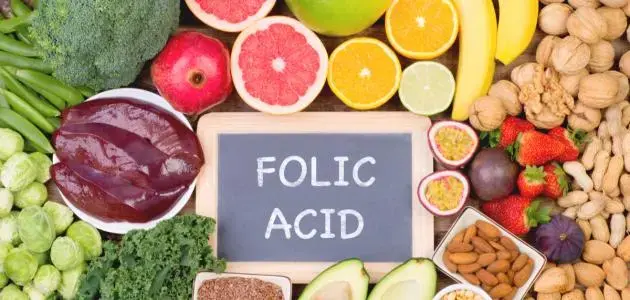Folic acid is a form of vitamin B9 that dissolves in water and plays a key role in making DNA, which is part of our genetic material. It’s also crucial for making red blood cells, keeping babies’ brains healthy, and even helping prevent hearing loss.
Folic Acid vs. Folate: What's the Difference?
People often use "folic acid" and "folate" interchangeably when talking about vitamin B9, but there’s actually a difference. Folic acid is the synthetic form—it doesn’t naturally occur in foods but is found in supplements and fortified foods. Folate, on the other hand, is the natural form found in foods like fruits, veggies, and legumes.
The active form of vitamin B9 is called 5-methyltetrahydrofolate (5-MTHF). Our bodies can convert natural folate into this active form in the digestive system before it enters the bloodstream. Synthetic folic acid, however, must be processed in the liver and other tissues, which can be slow and isn’t always efficient for everyone. Because of this, some people might end up with unmetabolized folic acid in their blood after taking supplements, which could be harmful. So, it’s generally better to get folate from natural food sources, though some people—like pregnant women—might still need supplements.
Fruits Rich in Folic Acid
Many fruits naturally contain folate. Here are some of the top ones:
- Papaya: One cup (about 140g) of raw papaya has 53 mcg of folate, which is around 13% of your daily needs. It’s also packed with antioxidants, vitamin C, and potassium.
- Avocado: Half an avocado gives you 82 mcg of folate, about 21% of what you need daily. It’s also rich in vitamins C, K, B6, and potassium.
- Banana: One banana has 23.6 mcg of folate, about 6% of your daily intake, plus magnesium, potassium, and vitamin B6.
- Pomegranate: This fruit has folate, vitamin K, calcium, fiber, protein, and iron to help prevent iron deficiency.
- Guava: A great source of folate, vitamins C and E, antioxidants, and is helpful during pregnancy for digestion and muscle relaxation.
- Mango: One cup offers 71 mcg of folate, which covers 18% of daily needs.
- Kiwi: A cup gives you about 11% of your daily folate.
- Strawberries: One cup covers around 10% of your daily folate.
- Citrus fruits: A large orange provides about 14% of daily folate needs and lots of vitamin C.
- Cantaloupe: Half a cup has 17 mcg of folate.
Other Great Sources of Folate
Besides fruits, here are some other folate-rich foods:
- Beef liver: One 3-ounce serving contains 54% of your daily folate.
- Beets: One cup has 148 mcg, about 37% of daily needs.
- Sweet corn: One cup provides 61 mcg or 15% of daily folate.
- Lettuce: One cup offers 16% of your daily folate.
- Edamame: One cup supplies 121% of your daily folate.
- Asparagus: Four spears have 89 mcg of folate.
- Broccoli: Half a cup cooked gives 52 mcg.
- Brussels sprouts: Half a cup cooked has 78 mcg.
- Legumes: Lentils and kidney beans are rich in folate. One cup cooked lentils provides 90% of daily needs, kidney beans about 33%.
- Eggs: One large egg offers about 6% of daily folate.
- Wheat germ: 1 ounce gives 20% of daily folate, plus fiber and antioxidants.
- Spinach: One cooked cup contains 66% of your daily folate.
- Seeds and nuts: 1 ounce of walnuts gives about 7%, flaxseeds about 6% of daily folate.
- Fortified grains: Some breads and pastas are enriched with folic acid. For example, one cup of fortified pasta covers about 26% of your daily folate.
Recommended Daily Folate Intake
| Age Group | Daily Amount (mcg) |
|---|---|
| Birth to 6 months | 65 |
| 7-12 months | 80 |
| 1-3 years | 150 |
| 4-8 years | 200 |
| 9-13 years | 300 |
| 14-18 years | 400 |
| 19+ years | 400 |
| Pregnant women | 600 |
| Breastfeeding women | 500 |
Benefits of Folic Acid
Folic acid offers a bunch of health benefits, though some need more research. Here’s a quick breakdown:
- Proven: Treating folate deficiency effectively with supplements.
- Likely helpful: Preventing neural tube defects in newborns. That’s why women of childbearing age are advised to get at least 400 mcg daily, often through prenatal vitamins that contain the active methylated form of folate.
- Lowering homocysteine levels: This compound is linked to inflammation and heart disease, and folate helps reduce it. However, lowering homocysteine doesn’t always mean fewer heart problems because many factors play a role.
- Reducing side effects of rheumatoid arthritis medication: Folate supplements can cut side effects from methotrexate, a common treatment.
- Possibly helpful: Improving depression symptoms when taken with antidepressants, and lowering the risk of cleft lip and palate.
- Not enough evidence: On preventing autism or cancer risk. Some studies suggest folate might protect against certain cancers, but high doses of synthetic folic acid could increase tumor growth in some cases. More research is needed.
Leave a comment
Your email address will not be published. Required fields are marked *




